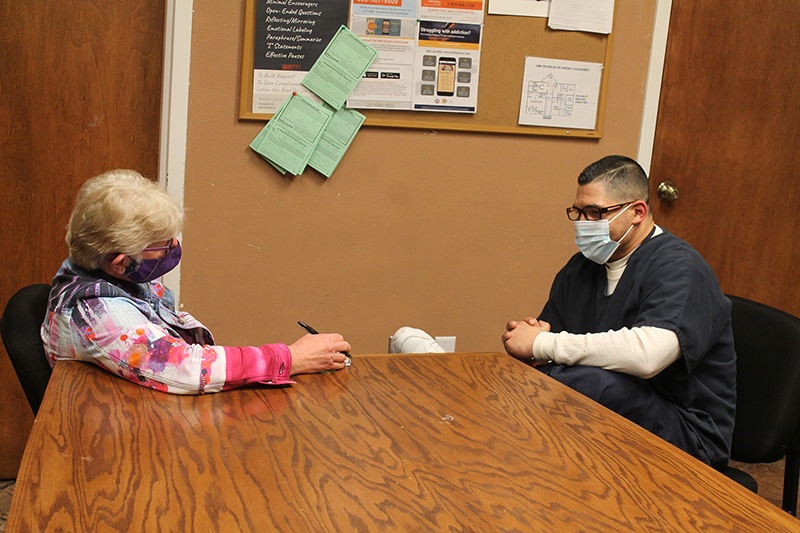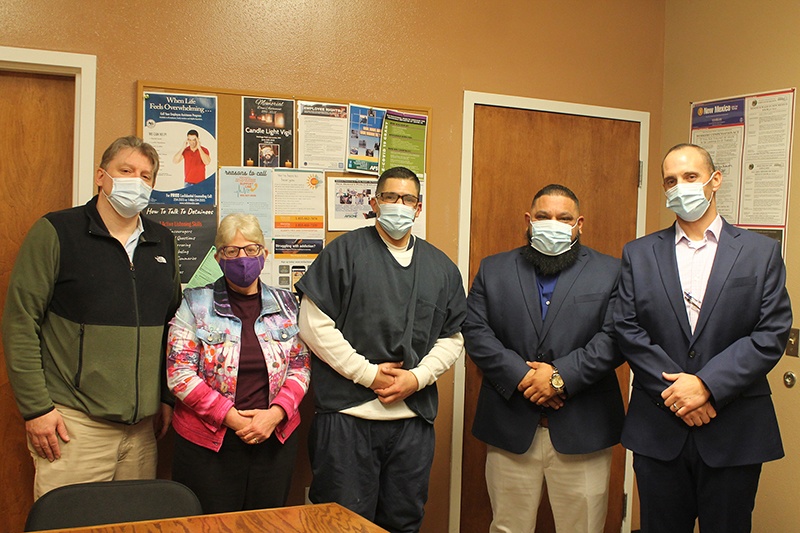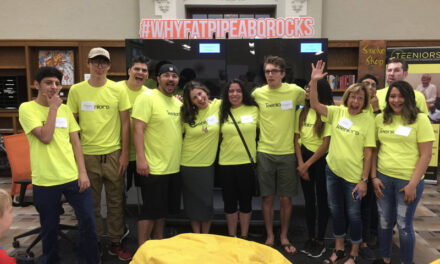The cycle of addiction and incarceration can often feel like a never-ending wheel of despair.
Thanks to a grant from the state of New Mexico, the staff of the Valencia County Detention Center, in partnership with a local intensive outpatient program, has made strides in the last two years to break that cycle and reduce local recidivism rates.
About 2 1/2 years ago, the state reached out to about half a dozen counties offering funding to start pilot programs to reduce the revolving door of inmates at county jails.
“The grant was kind of like an open book,” said VCDC compliance and programs manager Derrick Garley. “The main goal was to stop recidivism in jails. They allowed us to come up with our own ideas, things that would work in our specific facility.”
The program — called RISE (Reach, Intervention, Support and Engage) — was launched under the supervision of former jail warden Joe Chavez and assistant warden Randy Gutierrez, who is now the warden.
In its third year, 93 percent of the 102 detainees who have participated in RISE and been released haven’t ended up back in jail. Garley said the 7 percent who have reoffended and been brought back to jail, immediately want to start the program again.
“The biggest block we identified immediately was substance abuse,” said Garley. “That is what we had to overcome to get them on their way to having a successful life. So, 90 percent of our inmates, as a whole, have substance abuse issues. That is part of the requirement to be in the RISE program. We knew we needed to conduct therapy, and that’s when we got involved with Full Circle.”
Billy Garberina, a licensed clinical social worker with a practice in Albuquerque, said he routinely had clients from Valencia County make the trip north to his office. Recognizing that as a significant barrier to access, Garberina opened a second location in Los Lunas and eventually a third in the city of Socorro.
“Now, when they are released, we are literally around the corner,” Garberina said. “They work with Derrick, they have Medicaid in place, have a clinical assessment and if they opt to, they can continue their clinical visits and have a place to land.”
As demand for services grew, Garberina was able to bring on Allison Else, a licensed mental health counselor who also works with clients in the RISE program.
“Now they have an established therapeutic relationship with myself or Allison, so once they are out, if they feel like they are relapsing, they can reach out to us. Clients are connecting back to therapy and that is really making a difference,” he said.

Julia M. Dendinger | News-Bulletin photo
Allison Else, left, a licensed mental health counselor who also works with clients in the RISE program, talks with Jonathan Baca, a RISE client who is ready to get his life back on track.
As the program developed, Garley said jail staff included the detainees in its planning.
“We asked them, ‘Why do you keep coming back to jail?’ What we found is that they just kept going back to the same problematic areas,” he said. “They wanted to get their GED. They wanted to get a job. They wanted to get their (driver’s) license and go do things, but they never had anybody to help them.”
Starting with a handful of detainees, as their release dates neared, Garley and Gutierrez asked the men and women in the jail what they needed. They needed a place to stay that didn’t have the same people and bad habits from before their incarceration, a chance to get a legal job — a chance to change.
Born and raised in Valencia County, Garley reached out to local employers willing to hire someone with a criminal record. That’s when the second roadblock cropped up.
“We set up job interviews and things went well until they were asked for their Social Security card and state ID,” Garley said. “We had to take a step back. We started helping them get their Social Security cards, we used the grant to pay to get their birth certificates, and then from there, we would meet them at the MVD and we would get them a state-issued license.”
Garley and other jail staff help former detainees build resumes, brutally-honest resumes that laid out their skills and gaps, and hold mock interviews. To remove former detainees from old environments, the jail partners with housing providers, mostly in Albuquerque.
“We found that once we help them and they get out there and get started, they can continue with that process,” he said.
The grant also allowed the detention center to enter into a memorandum of understanding with Rio Metro here in Valencia County to provide transportation for detainees to get them to court dates after release or a train ride to Albuquerque.
Since the program allows for a great deal of flexibility, Garley said they have been able to deliver very personalized service. One of the program’s very first clients was released but couldn’t return home because of restrictions placed on him by the New Mexico Children, Youth and Families Department.
“He had been accepted into a recovery center in Santa Fe but there wasn’t a bed open yet,” Garley recounted. “The program was able to pay for a hotel for him for those two weeks to make sure he didn’t go back to the places that were going to cause trouble for him.
“We talked to him on a daily basis. We safely got him to the recovery center. He became an instructor at the center, a leader, and when he completed it, he came back and gave us a copy of his graduation certificate. He hasn’t been back (in jail) since.”
As a resident of Valencia County, Gutierrez often sees former detainees out in the community, and it’s not always the best of circumstances, he said.
“You will see someone begging for change on the street and you know they’ll be back here soon,” Gutierrez said. “But this program has changed things.”
One day, while out getting lunch, Gutierrez caught three women who had went through the RISE program at a local restaurant applying for jobs.
“I’m all for this program, you know. Seeing these individuals at Walmart and all these places with their family doing really good, it’s gratifying,” he said.

Julia M. Dendinger | News-Bulletin photo
It takes a team effort to help detainees at the Valencia County Detention Center take steps to not reoffend and come back to the jail. The RISE program relies on, from left, Billy Garberina, a licensed clinical social worker, and Allison Else, a licensed mental health counselor, with Full Circle Recovery, to help detainees like Jonathan Baca, center, along with VCDC Warden Randy Gutierrez and Derrick Garley, the center’s compliance and programs manager.
Clients in the RISE program meet with either Else or Garberina for 45 minutes twice a week, and Else has recently started offering group therapy sessions to male detainees.
VCDC has received two rounds of grant funding — the initial $370,000 and then $400,000. Gutierrez said the state has indicated the program will be funded for another two years, then it will be time to go to the county commission and ask for it to be made part of the budget.
Word of the RISE program has made its way into the community, he said, and defense attorneys, family members, even some judges are asking how to get people involved.
“It’s not that kind of program, but maybe someday, it could be,” the warden said. “If I can get half my detainees in this program and lower recidivism, I’d rather see these guys being productive citizens than back in jail.”
Because the program targets people habitually returning to jail, clients have to have been incarcerated more than four times in three years, and have a co-occurring substance abuse and mental health need.
VCDC trustee Jonathan Baca, a client in the RISE program, is looking forward to being released some time in January.
“I was just at my wit’s end. Thank God for putting these people in play. It was just a breath of fresh air,” Baca said. “I’m so grateful that they’re here. It works if you work it.”
In jail on charges of aggravated fleeing, possession and felon in possession of a firearm, Baca said he was on a cliff, ready to go over before he was asked to be a part of RISE.
“I know that they’re there to back me up and to work through all the problems that I’ve got,” he said.
While at VCDC this time, Baca got engaged and married, and when released plans to start a life far from his old stomping grounds — he will be relocating to Brooklyn, N.Y.
“I got my identity back, my life back. That’s really kept me accountable, you know, not to bring in drugs, not to do drugs, you know what I mean?” he said. “These meetings weren’t for the judge. I’m not getting out early … I wanted to get my soul back and this program helped me.
“I don’t know what my future is gonna’ be like, but it’s gonna’ be cool. It’s like a whole drug in itself — sobriety.”
Julia M. Dendinger began working at the VCNB in 2006. She covers Valencia County government, Belen Consolidated Schools and the village of Bosque Farms. She is a member of the Society of Professional Journalists Rio Grande chapter’s board of directors.
















